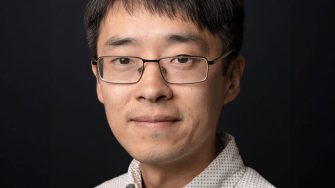Meet our WRC Researcher: Dr Kefeng Zhang
An ARC DECRA Fellow, Dr Zhang leads the Water Green Urban Management (WaterGUM) group at the WRC.
An ARC DECRA Fellow, Dr Zhang leads the Water Green Urban Management (WaterGUM) group at the WRC.

When it comes to transforming the future of urban water systems, there’s no end to the new technologies making their way onto the global stage.
But at the UNSW Water Research Centre (WRC), Dr Kefeng Zhang is going back to basics.
“My research is focused on nature-based systems — in Australia, we call them water-sensitive urban design systems, but they’re also known as Sponge City or low-impact development,” he says.
“The idea is to enhance urban planning and design for effective stormwater management and flood mitigation through nature-based processes [by using] plants and engineered media.”
An ARC DECRA Fellow, Dr Zhang leads the Water Green Urban Management (WaterGUM) group at the WRC.
Here, he and his colleagues look at the development and optimisation of nature-based green technologies such as raingardens/bioretention systems and green walls.
They also investigate the use of integrated urban modelling to incorporate these technologies into real-world urban systems.
“These systems reduce the flow of water during rain and stop contaminants from reaching our waterways by mimicking the nature water cycles as closely as possible,” Dr Zhang says.
The WaterGUM group has an 80 m2 greenhouse laboratory for technology development at UNSW Kensington Campus. Out at the Water Research Laboratory, a WRC facility at Manly Vale on Sydney’s northern beaches, they’ve established a series of pilot systems to demonstrate and validate their work.
And their remit is growing: in the early days, Dr Zhang’s research was focused almost entirely on stormwater, including monitoring and modelling stormwater quality and the pollution and risk associated with various re-use pathways.
Now, he and his team are expanding into greywater and pre-treated wastewater, too.
“Greywater is the water from sinks and showers, as well as laundries,” he says.
“Our aim is to purify these water sources for fit-for-purpose reuse via decentralised nature-based systems.”
Current projects include advancing these nature systems to remove contaminants from various water sources using real-time monitoring and control techniques.
“Chemicals from personal care products, as well as from pharmaceuticals, pesticides and PFAS, which are widely used our daily life, all find their way into stormwater, greywater and wastewater,” Dr Zhang says.
“We have a few students working on our pilot system to see how they can remove trace chemicals and microplastics from these water sources.”
Collectively, Dr Zhang and WaterGUM’s work is becoming increasingly vital in a changing climate.
As well as increasing urban water supplies and making nature a vital part of urban water systems, this research offers low-cost sustainability solutions that are now more crucial than ever.
“Green systems are multi-beneficial, from mitigating climate change, reducing greenhouse gases and improving urban amenity to reducing land surface temperatures,” Dr Zhang says.
“That’s how I envision my work: it’s part of the green future.”